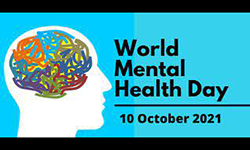MENTAL HEALTH IN AN UNEQUAL WORLD
By Femi Olugbile
On the tenth day of this month, it will be World Mental Health day 2021. The World Mental Health Day is a day set aside by the global community for drawing attention to Mental Health issues. The idea was first mooted by the World Federation of Mental Health (WFMH) in 1992. The first celebration that had a theme occurred in 1994.
The World Federation for Mental Health itself was founded in 1948, in roughly the same time-belt as the United Nations itself and its key health organ – the World Health Organisation. It was led essentially by psychiatrists but included volunteers from a broad spectrum of other professions. They were interested in human rights and social development issues surrounding mental health. In reality it was the first international Mental Health NGO, and it has remained since in active collaboration with United Nations agencies.
The importance of mental health in society and the range of challenges it can present have been especially in focus all around the world in much of the past two years. The predominant event of that period, of course, has been the advent of the COVID19 pandemic. The pandemic has brought with it a totally unprecedented bouquet of challenges which people found extremely difficult to cope with. There was the illness itself, spreading rapidly across nations and between people, wreaking havoc in communities and creating a realistic fear in virtually everyone that they could be the next victim. There was the trauma of regularly seeing images of people suffering and succumbing to the disease. In Nigeria, for reasons that are yet to be fully ascertained scientifically, the disease seemed to show a proclivity for striking down well known, highly visible people in society, and leaving the inobservant proletariat in their overcrowded tenements barely scathed.
But perhaps the most problematic issue that arose because of COVID19 came about as a result of the enforced lock-down at different times in many countries. It was an interregnum that stretched the nerves of people everywhere almost to breaking point. People discovered that being at home with family twenty-four hours a day, without the ability to ‘escape’ to the office was not the unmitigated pleasure it might have looked from a distance. Domestic violence and intimate partner homicide spiraled. People became uncertain about the future of their work. The assumptions concerning what was an ‘office’ and how work should be done were shaken to their foundations.
But in the long march of Mental Health, COVID19 will prove merely a blip, though one that has inspired fear and opened eyes.
The state of mental health services in most countries of the world leaves a lot to be desired. In Nigeria, the picture is as bleak as ever. Most episodes of mental illness. to this day, go undiscovered and untreated, leaving an army of ‘walking wounded’ in the population carrying out the rituals of everyday life.
The issue of ‘INEQUALITY’ as described in the theme of the World Mental Health Day for his year is a very important one. Among nations, as among individuals, resources are not equitably distributed. There are rich people with a lot of disposable income, including income they may use to buy the best mental health care possible for themselves and their family. There are families who are not able to tell where their next meal is going to come from. All the categories of mental illness exist in both rich and poor. However, extreme poverty such as exists in some of the most deprived areas of Nigeria and the world at large, is a vulnerability factor for many illnesses.
Inequality exists not just between people, but even more starkly between nations. There are nations who are, by and large, able to meet the needs of their people. There are other nations, such as most of the nations of Africa, where there has been a tradition of relying on other nations to do the thinking and find the cures for illnesses that ravage their people, such as Malaria and Sickle Cell Disease. In situations such as COVID19 where resources are universally stretched, it is only reasonable that ‘rich’ nations will look after their own people first, whether in relation to vaccines or to other materials, before attending to the needs of dependent others.
What the theme of this year’s mental health day intends to say is that we are all in it together, as a people, and as a world. The attention of a post-COVID19 world should not just be focused on having rich nations responding to the heightened awareness of their people concerning Mental Health by scaling up preventive and curative service provision. Rather, everybody’s attention should be on seeing that ‘nobody is left behind’. ‘Poor’ nations should focus not on how much ‘aid’ they can extort from their rich neighbours by tugging at their heart-strings with their long-standing sense of ‘entitlement’, but on how they can expand their own capabilities to respond to their people’s needs. They, more than anyone else, also need to think about how medical and mental health care of good quality may be made to reach the most deprived segments of their population.
It is still unassailable commonsense that primary health care, including basic mental health care, deployed and made available virtually at every citizen’s doorstep, is the way to go. This can only be made sustainable by a system of Health Insurance in which all citizens contribute a minimal subscription and government serves as regulator and also pays the subscriptions for the vulnerable citizens who have no income.
Beyond the feel-good rhetoric that will come out from the mouths of Ministers and Commissioners of Health on the World Mental Health Day, 2021, this should be the heart of the message, if the world is truly determined to end inequality in Mental Health to the citizens of the world.

